Two years of activist legal solidarity
A case study of the BLOCKADE IMARC 2019 – Arrestee Support Team
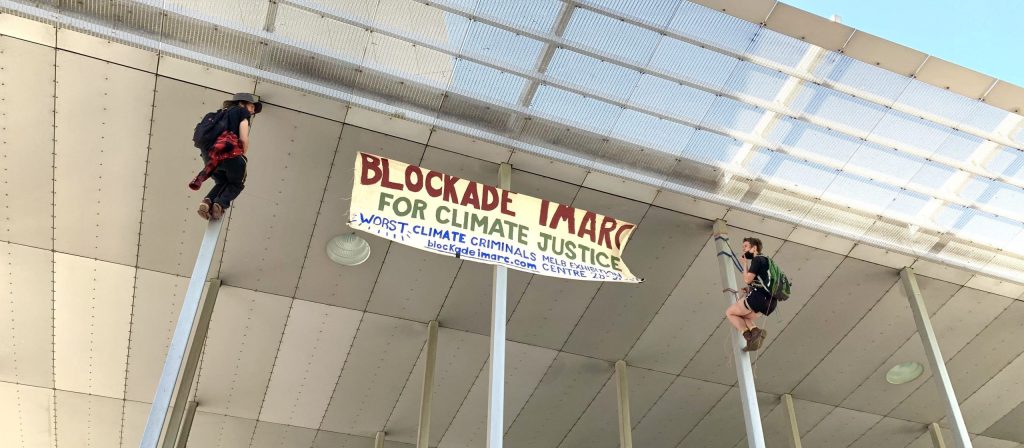
The International Mining and Resources Conference (IMARC) was held at the Melbourne Convention & Exhibition Centre over three days in October 2019.
Hundreds of activists also gathered to promote climate justice and protest the profit mining companies gain from the exploitation of the planet, workers and Indigenous peoples. Their demonstration included a First Nations smoking ceremony, marches, a ‘die-in,’ mock dinners, public speeches, musical performances and a human barricade of building entrances.
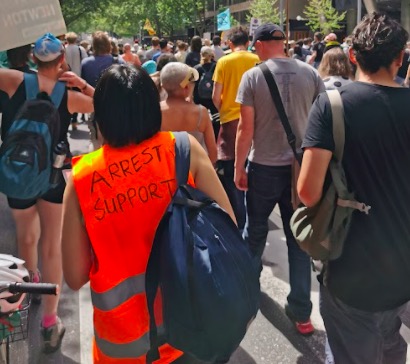
Police responded to these nonviolent activities by applying shocking levels of force and crowd control techniques designed for circumstances where police face direct physical threat. The use of mounted police, capsicum spray and batons lead to violent and dangerous clashes. Melbourne Activist Legal Support (MALS) released a detailed report of the policing in December 2019. By the end of the conference 107 demonstrators had been arrested and 4 people injured including one person hospitalised.
BLOCKADE IMARC, an alliance of 26 groups, including unionists, environmentalists and animal rights activists, led the demonstration. A critical part of the organisation was legal support. In the months leading up to the protest, Blockade IMARC had established a comprehensive and effective process for supporting the legal needs of activists before, during and after the action.
Before the Blockade
Four working groups were established in the lead up to the Blockade. The Skills and Services group was responsible for legal support. Legal support documents were prepared and available at the onsite Info Hub as well as on a dedicated website. Pro bono legal support was arranged and offered to protesters. Critically, the group made a commitment to follow through with all arrestees until the final court case had been resolved. MALS was invited to provide a legal briefing at a skill-share gathering in the weeks prior that was attended by about 70 people.
During the Blockade
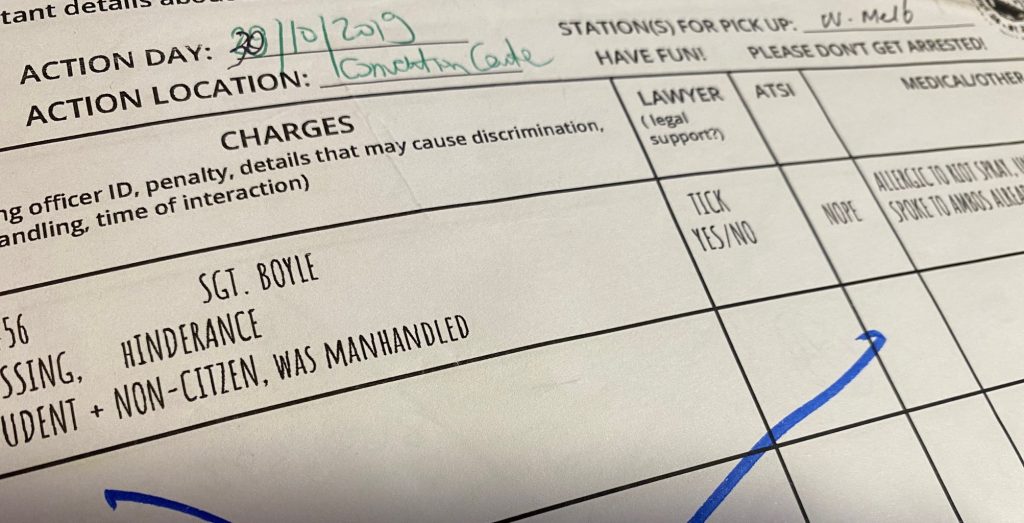
On the days of the protest itself information about legal rights and how to behave if questioned by police or arrested was made available. Activists were encouraged to write the phone number of the legal support team on their arm. This was to be used in case of arrest so that team members could locate arrestees and pick them up from wherever they had been taken by police.
Throughout the three days of action the legal support team made every effort to record the names and phone numbers of all arrestees. This list was crucial for the ongoing support of arrestees.
Arrestees were met outside the police station once they were released and the process of linking those charged with legal support began.
After the Blockade
When BLOCKADE IMARC met in early November, following the protest, they had a list of about 90 arrestees. Given how quickly police removed arrestees from the site there was concern that the contact details of some arrestees had not be recorded. A call was sent out by email and social media post asking all those arrested to get in touch so they could be provided with the pro bono legal contact and any other required support. Crowd funding via social media had raised around $30,000 for legal costs.
Although a law firm was offering no cost legal representation some extra funds were needed for more complex cases, outsourcing, diversion costs, and fines. The organising committee also wanted to collate details of charges and court dates, as well as those released without charge. The legal support phone number, used during the protest, remained active as a point of contact.
The committee organised a roster of volunteers to make regular contact with arrestees. Each volunteer was responsible for, at least, a monthly check in with a small group of arrestees, until their cases were finalised. A script was created for the initial contact as it was important to ensure consistent access to information and to protect sensitive legal information. These phone calls were not subject to legal privilege and could be subpoenaed. Volunteers were mindful that they needed to stress that they were not lawyers and could not make legal assessments but could provide contact details to legal support and ensure the arrestees were engaging with the law firm.
Arrestees were also offered solidarity and welfare support. They were connected with a free counselling service and the option to join a group chat with other arrestees if they chose. Injured arrestees were directed to a community legal centre to seek advice about compensation claims.
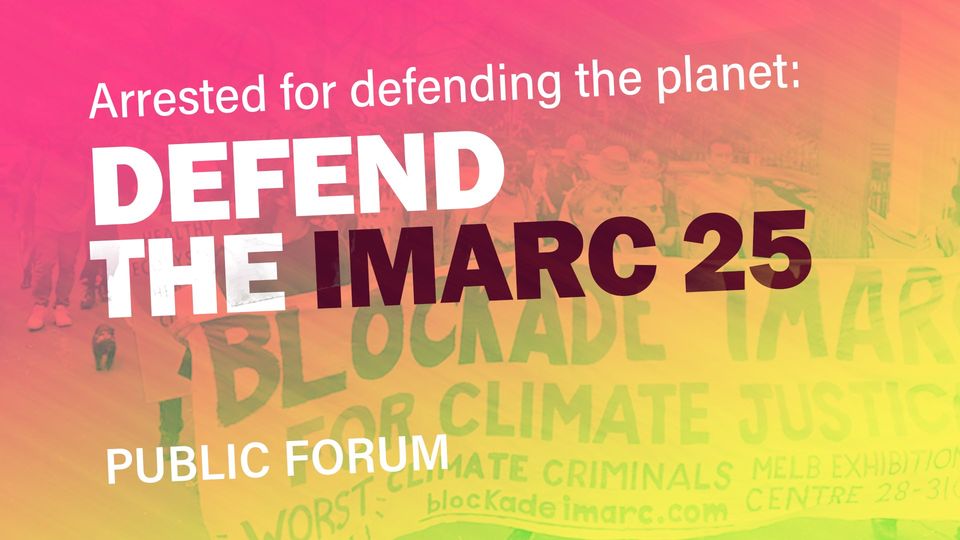
It was also recommended to arrestees that they seek legal advice before making formal complaints against police. While these can be useful in terms of media attention and an IBAC record, there is potential for inadvertent admissions that could later be used against a complainant in court and/or counter charges from the police. No documentation of any complaints nor the outcomes of these complaints was collated.
In hindsight it has been thought that Blockade IMARC could have pursued this more vigorously and sought collectively to hold the police accountable through political and legal processes.
The volunteers were able to connect by phone with the majority of arrestees, some of whom were quite distressed and appreciative of the contact. In addition, two information sessions were delivered by a lawyer representing the law firm.
Court Solidarity
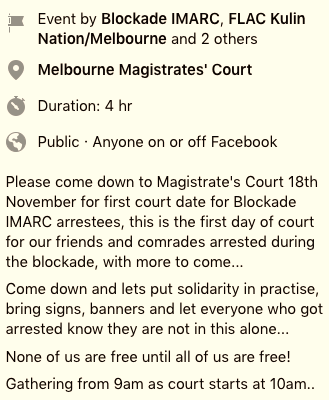
At least two court solidarity gatherings were held outside the Melbourne Magistrate’s Court on hearing days. The first was only about 6 weeks following Blockade IMARC and it attracted about 80 protestors and some media attention. The second, in early 2020, also saw many people attend to support the arrestees. On both occasions charges against about a dozen arrestees were being heard.
Following these initial dates however scheduled court appearances for arrestees were scattered and held remotely. While successful in supporting arrestees, such action was difficult to maintain due to the pandemic, individual cases proceeding on different days and many charges being dropped or directed to diversion just before a scheduled hearing.
The team of volunteers maintained their contact with arrestees throughout the legal process, checking in every couple of months, sometimes more if necessary. Remote court support via video link was even supplied a couple of times. Arrestees were linked with other protestors who may have had evidence useful to their case. The volunteers are persistent in their objective to follow through until the last case is closed.
“I’ve been to court by myself before and it’s a shit experience. Having Jerome [from the IMARC legal support team] come onto the Magistrates Court Webex call during my case made all the difference.”
Sean, arrestee.
Some issues arose when evaluating the legal support work of Blockade IMARC. One was the lack of a systematic collection of visual evidence of arrests and police behaviour. It has been suggested that a team should have been allocated the task of sourcing, compiling, and safely storing any digital footage and photographs. This evidence might have assisted in the defence of arrestees and even been useful in pursuing complaints against police.
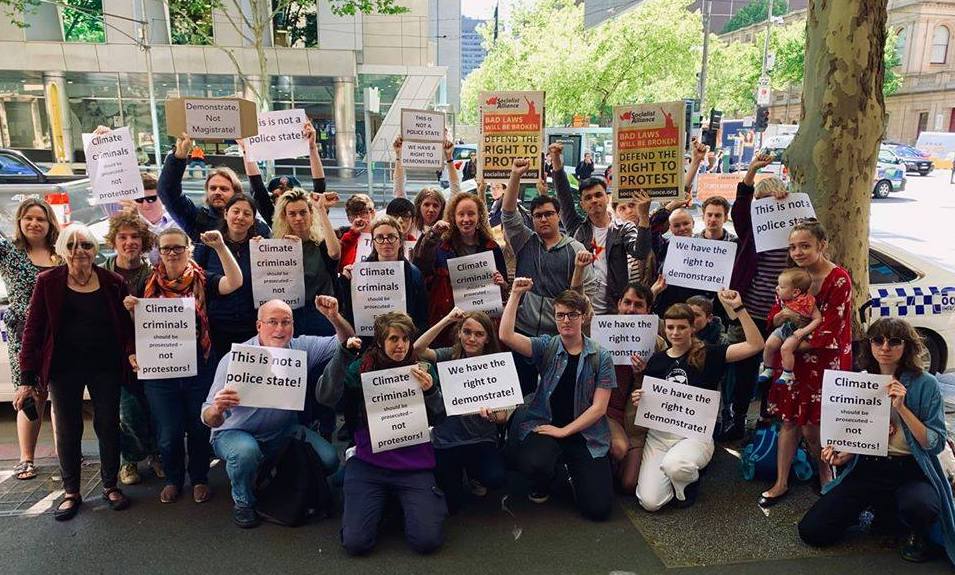
Activist strategies in court
Another interesting question centred around legal strategy. A lawyer had suggested that there could be advantage in at least a couple of arrestees refusing diversion and fighting the case in court. Evidence could have emerged that exposed police brutality and the tactics employed by police that led to violent confrontation. Unfortunately, as time passed, and charges were dropped, and diversions accepted such a collective action became less urgent. In future this may be a strategy to consider prior to the action so that challenging charges is part of a prepared overall plan rather than a belated reaction.
The legal support offered by the Blockade IMARC Arrestee Solidarity Collective has been remarkable in its ongoing commitment to the entirety of the process. This is rare in activist groups who all too often ‘abandon’ activists to deal with the court system by themselves long after the action has served its purpose.
The group was especially mindful of providing support to protestors who may be new to activism or not connected to a political group. It was important to Blockade IMARC that protestors felt a sense of solidarity in civil disobedience rather than experience isolation and fear.
MALS is grateful for the contributions of Anisa, Jerome and Anu during the research for this article. Their work in the BLOCKADE IMARC Arrestee Solidarity Collective and their reflections upon the process were greatly appreciated.
Jules De Cinque
Melbourne Activist Legal Support
For further reading: